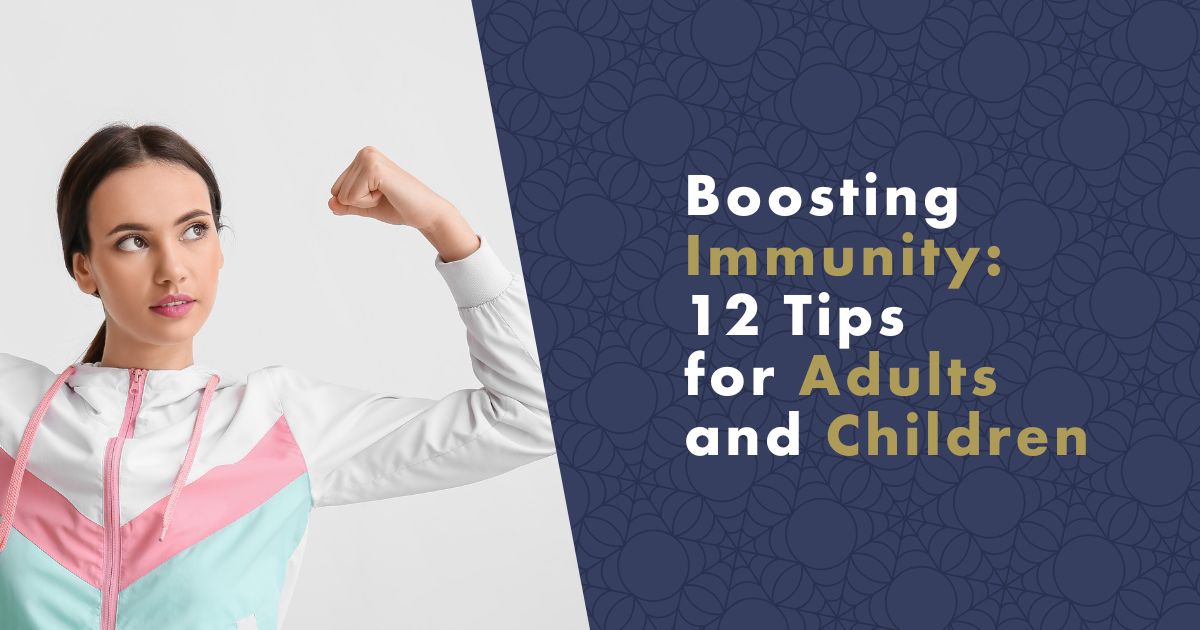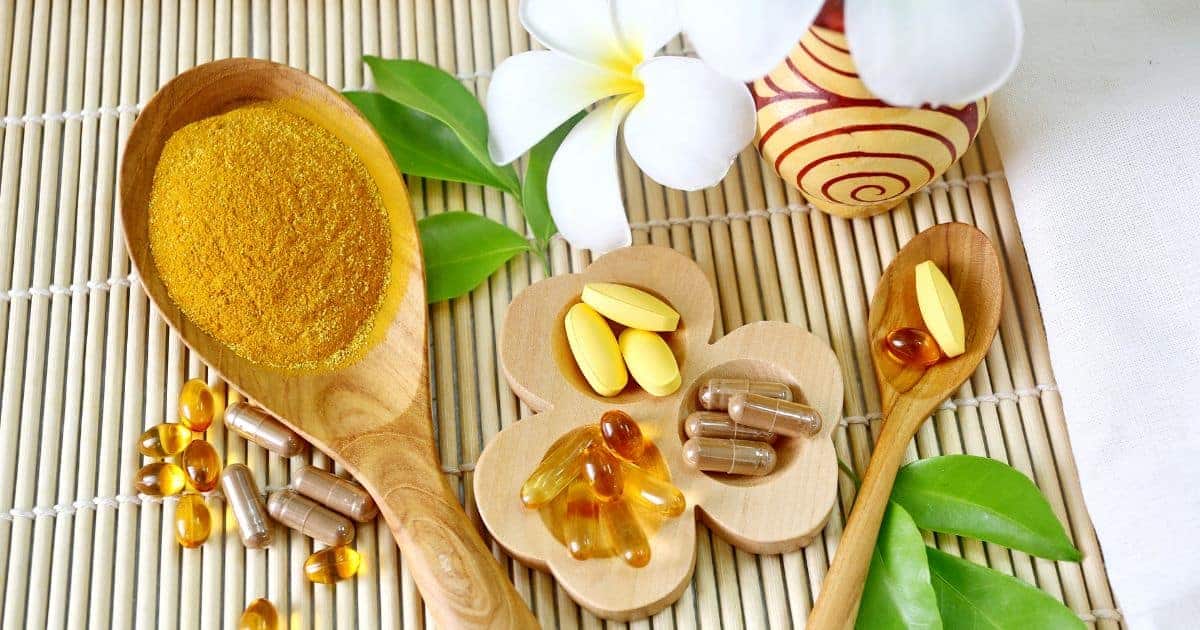Are you tired of constantly falling ill and feeling like your immune system is not up to par? Don't worry, we've got you covered. Our expert advice will guide you on what to do to strengthen your immune system, as well as that of your children. We'll delve into the vitamins that are most lacking during the months when our immune system is weakest and suggest ways to supplement them effectively. Read on to discover our top 12 tips for improving your immunity.

Uncovering the Top Reasons for Weakened Immunity
- Inadequate Sleep: Insufficient sleep can weaken the immune system and increase susceptibility to illnesses.
- Previous Illness: Suffering from illnesses like COVID-19 or flu can compromise the immune system, making it more vulnerable to diseases.
- Chronic Stress: Prolonged stress can lower immunity and increase the risk of diseases.
- Poor Diet: A diet lacking in essential vitamins and minerals can weaken the immune system.
- Alcohol Consumption: Regular heavy drinking can damage the immune system and make individuals more prone to illnesses.
- Smoking: Smoking can impair the immune system and increase the risk of diseases.
- Inadequate Physical Activity: A sedentary lifestyle can lower the body's defenses against diseases.
- Ageing: The immune system weakens with age and may become less effective at warding off diseases.
- Medications: Certain medications, such as those used in cancer treatment or organ transplants, can weaken the immune system.
Power Up Your Immune System: 12 Tips for Adults and Children
Improving your immune system requires more than just a varied diet rich in vitamins and minerals and regular exercise. It also entails maintaining a balanced mindset with minimal stress and, of course, getting enough quality sleep. Keep reading to discover how you can ensure that both you and your children have strong immunity.
1) Quality Sleep
While it may appear trivial, getting high-quality sleep is crucial for your overall well-being. Research indicates that poor sleep quality can lead to a shorter lifespan. Adequate sleep is beneficial for the brain, body, and skin.
To maintain a healthy immune system and overall health, it's important to establish a regular sleep schedule and stick to it. Aim to go to bed at the same time each night and get at least 8 hours of sleep. Consistency in your bedtime routine is key to achieving quality sleep, and getting 8 hours of sleep each day allows your body to regenerate at the cellular level.
Research shows that long-term sleep deprivation of less than 7 hours per day is associated with a significantly higher risk of contracting a virus compared to those who consistently get more than 8 hours of sleep. Moreover, a lack of sleep over time can increase the risk of developing various health issues, not just a weakened immune system.
In today's fast-paced world, many people struggle to get enough sleep. But if you prioritize getting at least 8 hours of sleep each night, you'll reap rewards like stronger immunity, greater satisfaction, and better cognitive abilities. Lack of sleep can even impact your hormonal system, so it's important to make quality sleep a priority.
2) Sufficient Healthy Movement
Improving your overall health is closely linked with strengthening your immune system. You don't need to be an elite athlete or engage in daily intense workouts to enhance your fitness. Even moderate physical activity such as regular walks, swimming, or cycling can be sufficient. To boost immunity, 30 minutes of exercise per day is enough. If you plan to run during the winter months, it's important to dress appropriately to maximize the benefits of your run.
3) Vitamin D Plays a Vital Role in Supporting Our Immune System
The presence of essential vitamins is crucial for a strong immune response. The lack of these vitamins, known as avitaminosis, can increase the likelihood of our immune system being ineffective at fighting infections. Among the vital vitamins, vitamin D holds a significant place in influencing the immune system. It plays a crucial role in the production of white blood cells that are crucial for fighting infections. Moreover, it helps in regulating the immune cells' activity, potentially reducing the risk of certain types of cancers. The deficiency of vitamin D can lead to a higher susceptibility to infections, including respiratory tract infections and tooth inflammation.
#produkty#https://www.nanospace.store/immunity/
4) Consume Adequate Amounts of Vitamin C
Make sure to consume enough fruits and vegetables to obtain sufficient vitamin C, an important nutrient for your body. A deficiency in vitamin C can cause various symptoms such as fatigue, headaches, bleeding gums, brittle nails, rashes, and weakened immunity. If you are unable to get enough vitamin C from your diet, you can also consider taking high-quality vitamin C dietary supplements quality food supplements.
5) Try Curcumin
Recent studies have demonstrated that curcumin has noteworthy antioxidant effects and can benefit the immune system. Research indicates that curcumin can improve the function of white blood cells and increase the activity of immune cells. Furthermore, curcumin has been shown to suppress free radicals, highly reactive particles that can damage cell membranes, proteins, and DNA, leading to apoptosis, or cellular "suicide." This process helps protect the body from tumor growth, which can occur when genetic information is damaged.
6) Take Enough Minerals
Maintaining adequate levels of minerals is also crucial for proper immune system functioning. Zinc and selenium are particularly important for immune health. A deficiency of these minerals can weaken the immune system as they are involved in hundreds of essential enzymatic processes in the body. Zinc plays a crucial role in preventing the entry of viruses into the nucleus of the cell, thereby inhibiting viral replication. Zinc also supports the production of various immune cells such as T and B lymphocytes, and natural killer cells, which play a crucial role in combating infections. This is why many immunity dietary supplements contain zinc. Some herbs such as coriander and parsley, which can be easily grown at home in smart pots, are excellent sources of zinc.
7) Harden Yourself
There are various ways to toughen up, such as taking a cold shower, regularly immersing in a frozen lake, or visiting a sauna. Numerous studies have confirmed the positive impact of toughening on enhancing the immune response. However, it should be noted that while toughening is beneficial for immunity, it is not a panacea and its effect is not significant.
During toughening, the body is exposed to short periods of stress, which can help it better cope with longer stressful situations that may weaken the immune system when exposed to external pathogens such as the common cold. Hardening can also increase blood flow in the respiratory tract, leading to a higher concentration of immunoglobulins on mucous membranes.
For example, taking a sauna can increase the formation and flushing of lymphocytes into the bloodstream. Lymphocytes are part of adaptive immunity and their numbers naturally increase in response to an infection that the first line of defense cannot handle.
8) Work With Stress
When we experience excessive stress, it can have detrimental effects on our immune system. Our bodies release hormones like cortisol, which can lead to inflammation and cell damage, ultimately weakening our ability to fight infections and exacerbating some diseases. Stress can even reduce the number of white blood cells that are crucial in our immune response. However, there are natural dietary supplements that can help mitigate stress.
#produkty#https://www.nanospace.store/search/?string=stress
9) Limit Alcohol
Consumption of alcohol can impair your immune system. It can decrease the number of white blood cells, which play a vital role in fighting infections. Alcohol can also disrupt the function of cells that are essential for the immune response and delay the process of wound healing. Furthermore, frequent and excessive drinking of alcohol can raise the likelihood of developing certain diseases such as cancer or diabetes. If you have been struggling with weakened immunity over a prolonged period, it is advisable to avoid alcohol altogether.
10) Limit Smoking
We are all aware that smoking is detrimental to our health. It disrupts our natural immune system and damages our cells, making it essential to quit smoking if you have immunity issues. Smoking also increases the likelihood of certain illnesses, such as cancer or asthma, and can exacerbate the progression of pre-existing conditions, such as diabetes.
11) Include Oyster Mushrooms in Your Diet
Various substances have been shown to enhance our immune system. Among them is beta-glucan, which is found in mushrooms. When beta-glucan enters our body, it is treated as a foreign substance and triggers our natural immune response, resulting in an increased production of phagocytes, which help to protect us from infections. While beta-glucan can be found in most mushrooms, oyster mushrooms are considered to be the most effective for strengthening the immune system.
Although the positive impact of beta-glucan on the immune system has been proven in many studies, there is still some debate among experts. However, there is a consensus regarding the cholesterol-lowering benefits of beta-glucan from barley. Even the European Food Safety Authority has recognized the health claim that beta-glucan from barley can "reduce blood cholesterol levels."
Tip: What helps bronchial asthma (asthma bronchiale)? Read in the article.
12) Try Colostrum - the Greatest Miracle of Nature
Colostrum is the term used to describe the protein produced by the mammary glands of mammals approximately 24-48 hours after giving birth. This fluid contains all the components necessary to ensure the health and energy of the newborn (a complex of immune and growth factors). Today, colostrum is extremely popular for boosting immunity in both adults and children, as it is likely the most natural substance to enrich your diet with for a child's immunity.
Colostrum contains antibodies (immunoglobulins) that act against bacteria, viruses, and fungi, as well as lactalbumin, which supports, among other things, cell regeneration. Colostrum has a positive effect on cell division and accelerates regenerative and healing processes in the body.
FAQ - Frequently Asked Questions
How can children's immunity be strengthened?
What are some ways to boost immunity quickly?
There is no single solution, but having a quality and balanced diet rich in vitamins and minerals, exercise, and sufficient sleep are all crucial. To recover quickly after an illness, you may consider taking vitamins to support immunity.
What are the signs of weakened immunity?
Weakened immunity may manifest itself in frequent infections, delayed wound healing, prolonged fatigue, loss of appetite, and weight loss.
Is there a universal cure-all pill?
While there is no such thing as a universal cure-all pill, Mindflow Longevity comes close as an anti-aging supplement.
Sources
- IRWIN, Michael. Effects of sleep and sleep loss on immunity and cytokines. Brain, behavior, and immunity, 2002, 16.5: 503-512.
- THOMAS, W. R.; HOLT, P. G. Vitamin C and immunity: an assessment of the evidence. Clinical and Experimental Immunology, 1978, 32.2: 370.
- HOLFORD, Patrick, et al. Vitamin C—An adjunctive therapy for respiratory infection, sepsis and COVID-19. Nutrients, 2020, 12.12: 3760.
- ARANOW, Cynthia. Vitamin D and the immune system. Journal of investigative medicine, 2011, 59.6: 881-886.
- HEWISON, Martin. An update on vitamin D and human immunity. Clinical endocrinology, 2012, 76.3: 315-325.
- JONES, Arwel Wyn; DAVISON, Glen. Exercise, immunity, and illness. In: Muscle and Exercise Physiology. Academic Press, 2019. p. 317-344.
- JAGETIA, Ganesh Chandra; AGGARWAL, Bharat B. “Spicing up” of the immune system by curcumin. Journal of clinical immunology, 2007, 27: 19-35.
- MEHTA, H.; NAZZAL, K.; SADIKOT, R. T. Cigarette smoking and innate immunity. Inflammation Research, 2008, 57: 497-503.
- FARD, Shila Hasanian; TOGHYANI, Majid; TABEIDIAN, Sayed Ali. Effect of oyster mushroom wastes on performance, immune responses and intestinal morphology of broiler chickens. International Journal of Recycling of Organic Waste in Agriculture, 2014, 3: 141-146.




